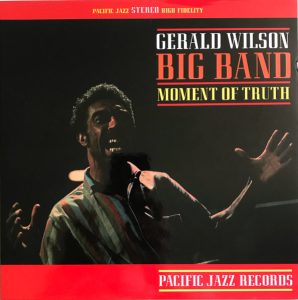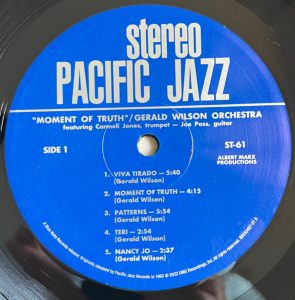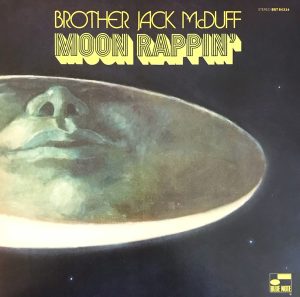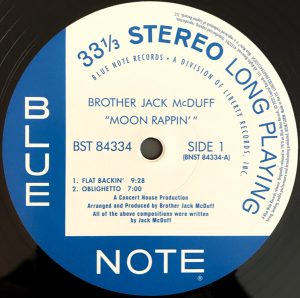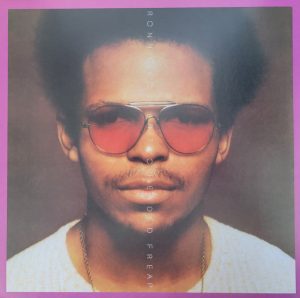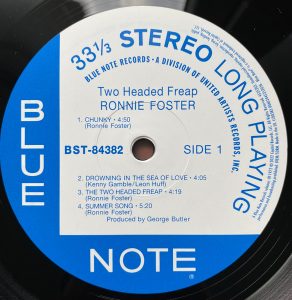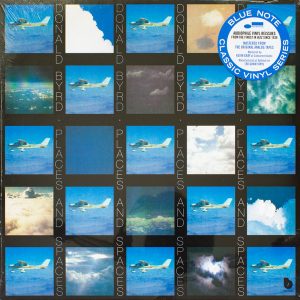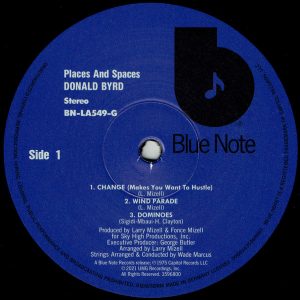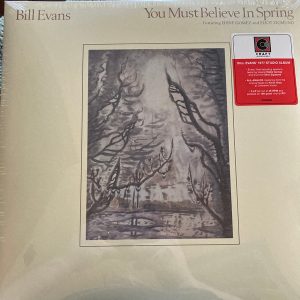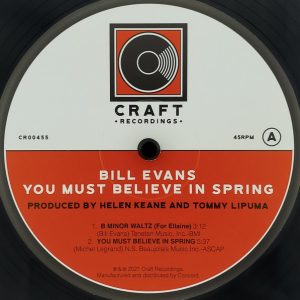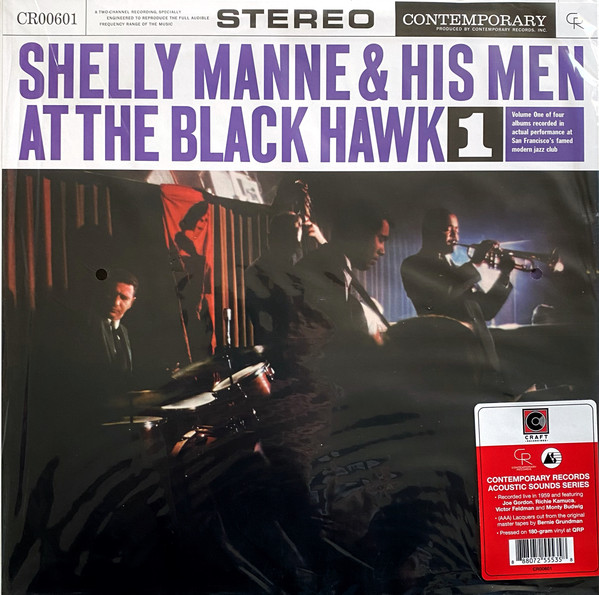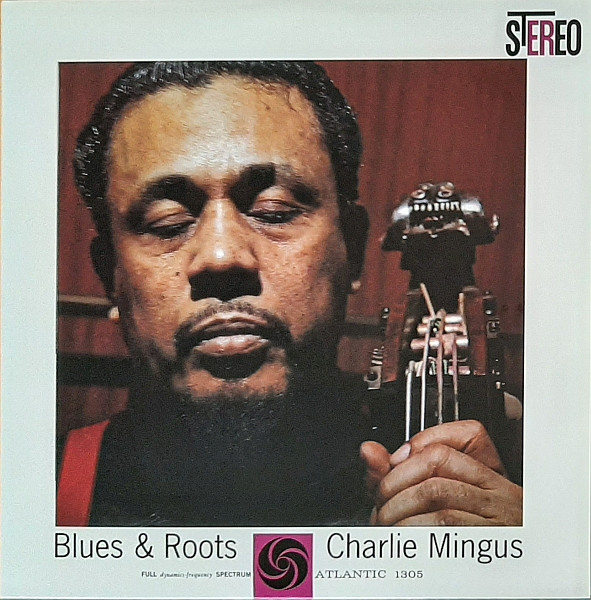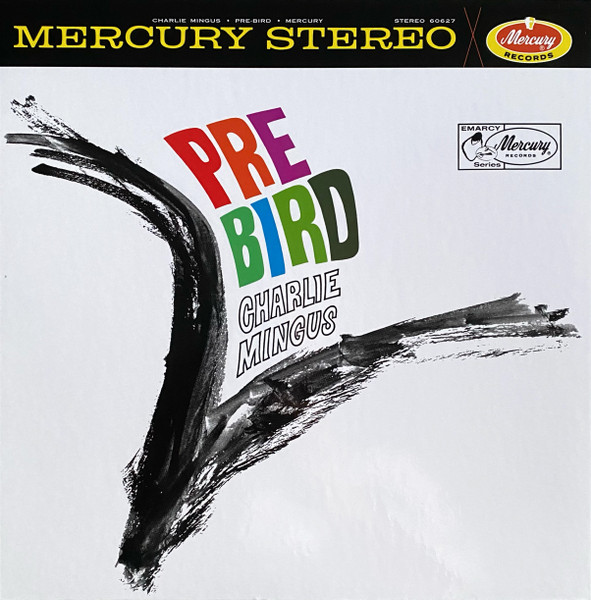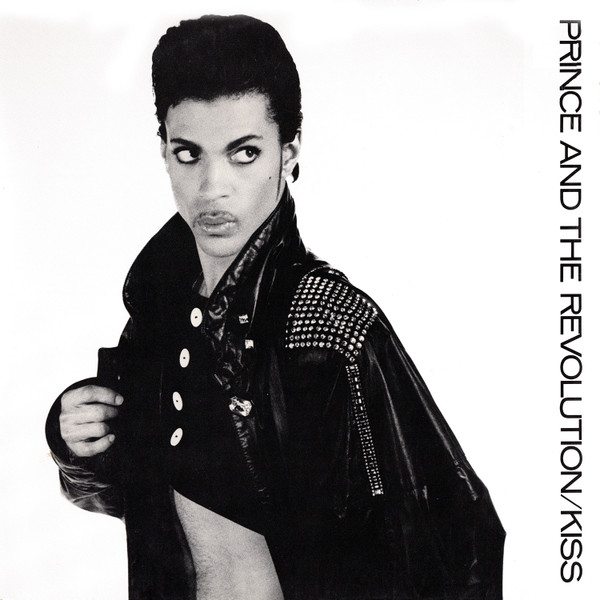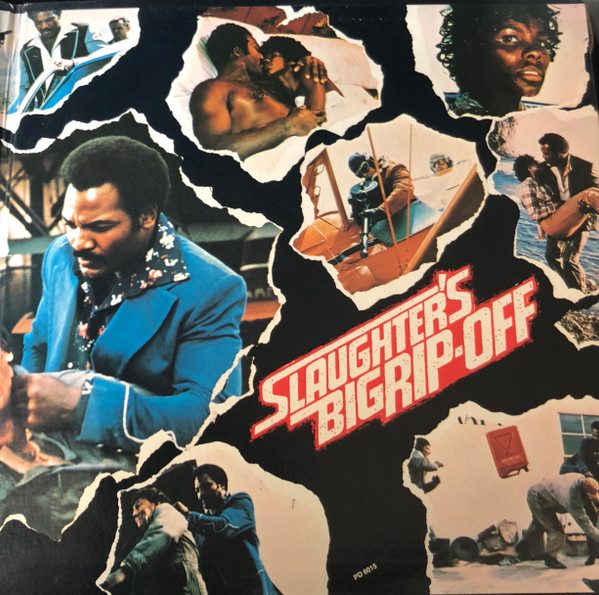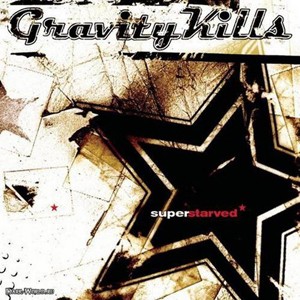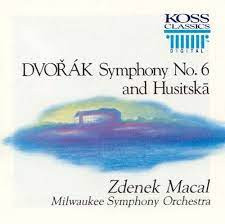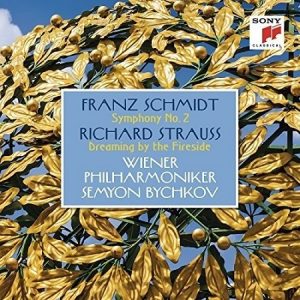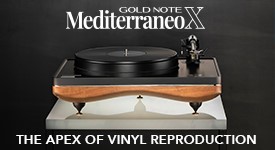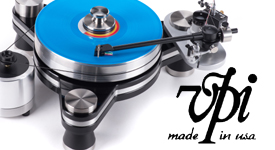Five Shades of "Gray"
This is an ongoing project by Claude Lemaire of Soundevaluations
196. Gerald Wilson Big Band, Moment of Truth. Pacific Jazz – ST-61-LA549-G (1962), Blue Note Tone Poet Series – B0033487-01 (2022), 33 1/3 rpm. Genre: latin jazz, big band swing, blues, ballads, soul-jazz.
Until recently Mississippi-born Gerald Wilson had totally passed under my radar. Were it not for Tone Poet making the effort to reissue his second album—even more surprising given that he had two dozen or so LPs as a leader and as many as a sideman—I would have remained in the dark about this talented trumpist, bandleader, composer, and arranger. Lucky for us he was signed to the wonderful-sounding Pacific Jazz label, under which he released eleven LPs in total. Wilson's big band comprises twenty-two musicians including non other than Joe Pass on guitar, Bud Shank on reeds, Al Porcino on trumpet, and Mel Lewis on drums. Some of them over the years participated in Stan Kenton's big band, and interestingly we can sense that transpire through certain of the ballad and Latin tracks Legendary record producer Albert Marx and West Coast producer and engineer Richard Bock recorded this outstanding album at Pacific Jazz Studios in Hollywood, California in August and September 1962. Eight out of the nine tracks are originals—the exception being Davis' classic "Milestones"—and incredible both musically and sonically. Similar to Contemporary Records, Pacific Jazz were and remain above the rest in terms of capturing the intimacy and timbral realism of all the instruments—piano included as opposed to typical RVG engineering—and this one is no exception, if not even surpassing previous Pacific productions. Kevin Gray at Cohearent Audio really knocks it out of the park on this one. The sound is perfect on all fronts with a full even tonal balance, generous plump bass, warm, close present mids yet not overly-front, crisp brass, solid drums, and exquisite top end detail. If ever there was a record fit for this TOP 500 list, it is this one. Killer Demo Material.
197. Brother Jack McDuff, Moon Rappin'. Blue Note – BST 84334 (1970), Blue Note Classic Vinyl Series UMe – 4535205 (Ger.) (2022), 33 1/3 rpm. Genre: soul-jazz, jazz-funk, swinging sixties vibe, psychedelic soul.
Along with Jimmy Smith, Brother McDuff was one of the leading jazz organist of the 1960s and continued as a leader and sideman through the 1970s up until his death in 2001. I had a few interesting albums from him on Prestige and Atlantic in my collection but this second release for the Blue Note label in May 1970 is more my cup of tea in style and sound. On this occasion he is accompanied by Bill Phillips on tenor sax and flute, Jerry Bird on guitar, Richard Davis on electric bass, and Joe Dukes on drums, in addition to two unknowns on trumpet, baritone and tenor sax. The drums are truly something. In fact, the drums are some of the best sounding ever recorded and mixed on record. Solid dynamic kick, crisp snappy snare, and cymbals to die for—the ride in particular has jaw dropping finesse and realism. The remaining musicians are also well served under the engineering of Bob Gallo at Soundview Recording Studios in New York in December 1969, and McDuff's own groovy arrangements and self-production. The electric bass is present and well rounded in the mix, sax has the right shimmering bite, and naturally the organ is shall we say, organic in texture and depth. This is one of the rare non-RVG Blue Notes from the era and it sonically shows for the better—at least with this type of groove-based jazz vs plain hard bop playing. All five tracks are McDuff originals of which the second—"Oblighetto"—has singer Jean DuShon contributing. I do not have the original Liberty Records pressing mastered by Columbia Records Pressing Plant, Santa Maria in California and cut by Mel Keiser but this "Classic Vinyl Series UMe" remastered and cut by Kevin Gray at Cohearent Audio and pressed at Optimal Media GmbH in Germany is outstanding and as good to my ears to the RTI-pressed Tone Poet releases which is impressive–artwork aside of course. Therefore I am confident that it surpasses an original Blue Note given past experience comparisons.
198. Ronnie Foster, Two Headed Freap. Blue Note – BST-84382 (1972), Blue Note Classic Vinyl Series UMe – 4535203 (Ger.) (2022), 33 1/3 rpm. Genre: proto-disco, cinematic soul, progressive, jazz rock fusion, soul-jazz, jazz-funk, psychedelic soul.
Unless you are one of the lucky ones to own an original pressing or you don't mind spending several hundred dollars to get your hands on one through the pre-owned market, this Blue Note Classic Vinyl Series reissue listed for about one-tenth the price is very welcome news and an attractive option. Produced by George Butler and arranged by Wade Marcus, Two Headed Freap is organist Ronnie Foster's debut album—he just released his ninth album in July with six out of those on the Blue Note label. In addition to organ, there are drums, bass, Fender bass, guitar, congas, percussion, vibraphone, and harp; all contributing to this eight track LP. The album launches with "Chunky," and that is pretty much how it sounds like with a rare mix of high octane funky proto-disco vibe with Keith Emerson prog-like sonorities. "Drowning in the Sea of Love" starts out rather smooth, loungy-like, with the vibes in the vein of Bobby Hebb's 1966 hit single "Sunny" (Philips PHS 600-212). Then halfway on, grooving at a higher tempo borrowing from a Booker T. & the M.G.'s style vibe. The title-track is definitely heavily-inspired by ELP's prog in the first half but then takes on more of a jazzy-jam feel. Side B opens with a beautiful cover of Al Green's classic soul hit "Let's Stay Together" (Hi Records SHL 32070) at first quite faithful to the original but progressing towards the second half into a soulful-funky organ vamp. Lastly Foster's secret recipe for their version of "Kentucky Fried Chicken" again uses strong ELP ingredients mixed with a liberal sprinkling of intense frenetic organ vamping. RVG recorded them in January 1972 at Van Gelder Studio, Englewood Cliffs, New Jersey with the closing track remixed by Don Hahn at A&R Studios in New York City. I never heard the original pressing but this remastering and cutting by Kevin Gray at Cohearent Audio is very well balanced with nice deep lows from the organ and electric bass plus crisp drums. Only minor quibbles are the organ sometimes sounding near distortion and just a tad high in level in the treble in relation to the overall mix; plus the music being very groove-oriented does feel a bit repetitive depending how one approaches the genre. Pressed at Optimal Media GmbH in Germany.
199. Donald Byrd, Places and Spaces. Blue Note – BN-LA549-G (1975), Blue Note Classic Vinyl Series UMe – 3596800 (Ger.) (2021), 33 1/3 rpm. Genre: soul-jazz, jazz-funk, funky disco, soulful disco, cinematic soul.
Trumpeter Donald Byrd was no stranger to Blue Note when he released this album recorded in August/September 1975. In fact it turned out to be his penultimate for the label after nearly two dozen as either leader or co-leader. That, in addition to thirteen prior releases, and seven afterwards on other labels—making Byrd a cat strutting the jazz catwalk. Not one to be confined to a particular style, he flew from hard bop to jazz fusion to funk, and even disco down the road. Along those lines a group of his students formed The Blackbyrds in 1973 and had a huge hit with "Walking in Rhythm" (Fantasy F-9472) in November 1974. All seven songs are wonderful starting with the opening track "Change (Makes You Wanna Hustle)" combining funk with disco such as B.T. Express, and Kool & the Gang practiced during that period. "Wind Parade" slows things down to a soulful disco laden with sultry strings, female back vocals, piano, and trumpet, that would fit like a glove on a Barry White/Love Unlimited production. Side B opens with the title track rich in strings and stirring trumpet, alternating in moods between a soulful disco to a harder funk feel. "Night Whistler's" intro has that psychedelic soul style. "Just My Imagination (Running Away with Me)" turns disco with the signature hi-hat pattern around the song's middle point. Produced by Larry Mizell & Fonce Mizell. Over at the Sound Factory, recording engineers Jim Nipar, Steve Maslow, Val Garay, and remixing engineers David Hassinger assisted by Jeff Hawks did an amazing job getting all the instruments at the right level. The original was mastered at Artisan Sound Recorders in California—which I don't have. Kevin Gray at Cohearent Audio got it "spot on" with this remastering and cutting reissue for the Blue Note Classic Vinyl Series UMe. The tonal balance is perfectly warm and extended, respecting the mid-1970s feel but with further refinement in the top end which I presume surpasses an original pressing. Even though it was pressed at Optimal Media GmbH in Germany that I often find inferior to RTI-pressed Tone Poet releases, this reissue is to my ears totally on par.
200. Bill Evans, You Must Believe in Spring. Warner Bros. Records – HS 3504 (1981), Craft Recordings – CR00455 (2022), (2x45 rpm). Genre: jazz.
Naturally when audiophiles think of Bill Evans, the label Riverside springs to mind. And for good reason—the latter's reputation gravitates towards the upper echelons of premium jazz recordings from the mid-1950s to the early-1960s—Sunday at the Village Vanguard (MFSL UD1S 2-002) and Waltz for Debby (Analogue Productions AJAZ 9399) being prime examples. But one would be a fool to skip this later period recording by Warner Brothers, newly-reissued by Craft Recordings, and now pressed by RTI on double 45rpm for the very first time. Produced by Helen Keane—his longtime manager—and Tommy LiPuma—well known for his work with Nathalie Cole and Diana Krall—here, Evans is accompanied by Eddie Gómez on bass and Eliot Zigmund on drums. This was Gómez's last pairing with the pianist, a collaboration going back eleven years together. There are seven tracks spread over four sides including two by the maestro, and the title track penned by Michel Legrand. The last track is "Suicide is Painless" better known as the instrumental "Theme from M*A*S*H", originally composed by Johnny Mandel. Engineer extraordinaire Al Schmitt recorded the trio at Capitol Studios in Hollywood, California in August 1977, but strangely the label delayed its release until 1981, only a few months after his death. Doug Sax at The Mastering Lab in Hollywood originally mastered and cut it. I never heard the original pressing of 1981 but the sonic comments on the net suggest it sounded really good. What I can confirm is the sound of this latest edition remastered and cut by Kevin Gray at Cohearent Audio is absolutely out of this universe, and as good as or even superior to any previous Bill Evans I ever heard. Every texture and detail is perfect. The piano floats within the boundless soundstage. Again, the finesse of the drums' skins, brushes, and cymbal are in the very best captured and transferred on any format. The bass has an uncanny realism and every nuance is so natural and easy to follow, this recording and remastering represents a true blue print for all to follow in how to do things. Judging by my ears, this seems to support the latest and near-constant upgrades claimed by Kevin Gray in recent web interviews regarding his mastering chain. Kudos Kevin and Craft, you've hit a home run with this one!
A note to my readers regarding the present "MoFi-gate"/scandal still unfolding as of this writing:
As most audiophiles I was very disappointed learning only recently about the inclusion of a DSD conversion (step) in Mobile Fidelity's mastering chain and record making methodology, affecting nearly all "One-Step" and many of their regular LPs going back some years now. Like many, I did not suspect nor admittedly detect any digital trace upon my listening's. Having covered several of their releases throughout the years, and praised many highly in my Top 500 List series, I feel it would be dishonest to start saying they don't sound as great now as upon first listen. Upon reflection, my view is the following: If for purely sonic reasons they merited their inclusion in the first place, certainly the last two weeks have not altered their sound or status—when taken well care for, the vinyl record is one of the most resilient formats ever produced. Therefore I will continue to evaluate and include future MoFi releases or any other label for that matter on a case by case basis when I find it is of interest to me and my readers.
For more from Claude Lemaire go to his blog...
http://soundevaluations.blogspot.ca/




